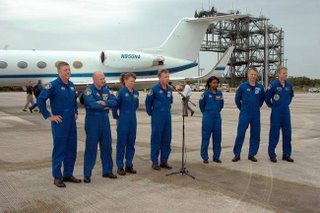
Getting Ready To Leave
Stephen Hawking says we might have to leave Earth to survive as a species.
The survival of the human race depends on its ability to find new homes elsewhere in the universe because there’s an increasing risk that a disaster will destroy the Earth, renowned scientist Stephen Hawking said Tuesday at a news conference in Hong Kong.Need we say more about the cause for space when Stephen Hawking himself pitches in?
The British astrophysicist said that humans could have a permanent base on the moon in 20 years and a colony on Mars in the next 40 years.
“We won’t find anywhere as nice as Earth unless we go to another star system,” said Hawking. He added that if humans can avoid killing themselves in the next 100 years, they should have space settlements that can continue without support from Earth.
“It is important for the human race to spread out into space for the survival of the species,” Hawking said. “Life on Earth is at the ever-increasing risk of being wiped out by a disaster, such as sudden global warming, nuclear war, a genetically engineered virus or other dangers we have not yet thought of.”
STS-121 Update
The crew have arrrived for launch rehearsal.

The next seven astronauts to fly the space shuttle Discovery arrived at NASA’s Florida spaceport Tuesday, each confident they will launch early next month and eager for a final dress rehearsal, their commander said.And so it goes again.
Veteran shuttle astronaut Steven Lindsey, commander of NASA’s STS-121 shuttle mission slated to launch July 1, said he believes the mission will lift off early in its 19-day flight window.
“I and my crew are pretty optimistic that early July looks good,” Lindsey said after his crew landed here at Kennedy Space Center (KSC) to practice launch countdown procedures with shuttle ground crews and mission controllers.
NASA managers will meet at KSC this weekend to pick a hard launch date for the STS-121 mission to the International Space Station (ISS), the space agency’s second planned shuttle flight since the 2003 Columbia accident, and hold press conference Saturday afternoon, NASA said in a statement.
Lindsey and his fellow shuttle crewmates walked off their jet transport at about 4:37 p.m. EDT (2037 GMT) after a two-hour flight from Houston, home to NASA’s Johnson Space Center, and one day of delays due to stormy weather spawned by Tropical Storm Alberto.
A veteran of three shuttle flights, Lindsey introduced reporters to his STS-121 crew: Discovery pilot Mark Kelly, mission specialists Michael Fossum, Lisa Nowak, Piers Sellers, Stephanie Wilson, and European Space Agency astronaut Thomas Reiter.

No comments:
Post a Comment